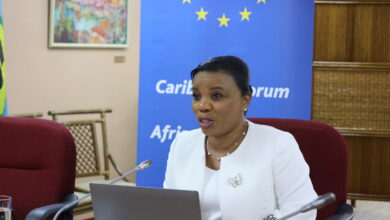Senior EU and Caribbean officials met in Brussels on Thursday 15 July to advance negotiations for an Economic Partnership Agreement which were launched in April. There was a broad understanding on the scope and priorities of the negotiations, which are aimed at promoting sustainable development in the Caribbean through increased trade, investment and regional integration. Agreement was reached on modalities for a task force set up to facilitate the inter-linkage between the negotiations and development assistance. Both sides also agreed to hold a number of technical and high-level negotiating meetings starting after the summer, so as to focus on specific issues relating to Caribbean regional integration relevant to the Economic Partnership Agreement. On 15 July a European Commission team headed by Karl Falkenberg, Director for Trade, met a group of senior Caribbean officials led by Richard Bernal, Director-General of the Caribbean Regional Negotiating Machinery (CRNM) and Caribbean Principal Negotiator on the Economic Partnership Agreement (EPA). This was the first official meeting since negotiations were launched in Jamaica on 16 April 2004. In keeping with the Joint Plan and Schedule for the negotiations, this meeting made good progress on its three agenda items: the scope and priorities of the negotiations; the Regional Preparatory Task Force; and the indicative negotiating schedule for the next fifteen months . Both sides exchanged views on the wider vision, objectives and principles for the EPA negotiations. There was a commonality of views on EPAs as an instrument for sustainable development, special and differential treatment for small Caribbean economies, the necessity of WTO compatibility, and the need for a stable and predictable framework for increased trade and investment. Recent developments on the EU regimes for bananas, sugar and rice were also discussed given their importance for the Caribbean region.
Recognising that development assistance was a fundamental aspect of EU-Caribbean relations, the meeting specifically addressed the link between the EPA negotiations, and development strategies and finance. It was agreed that the inter-linkage between both strands will be facilitated by a dedicated Regional Preparatory Task Force made up of development experts from both sides. Modalities concerning the functioning of the RPTF were agreed and the body will meet at the earliest opportunity. The next round of negotiations is scheduled for September with a meeting of Principal Negotiators, as envisaged in the indicative schedule of meetings up to September 2005. Regular technical meetings to examine priority issues of Caribbean regional integration are also scheduled during the upcoming phase of the negotiations. This will ensure that the EPA process bolsters and strengthens regional economic integration in keeping with Caribbean priorities. Background The ACP-EU Partnership Agreement (Cotonou Agreement), signed in Cotonou in June 2000, establishes a comprehensive framework for ACP-EU relations. At the centre of the partnership are economic development, the reduction and eventual eradication of poverty, and the smooth and gradual integration of ACP States into the world economy. In order to accomplish these objectives, the Cotonou Agreement provides for the conclusion between the ACP and the EU of new World Trade Organisation (WTO) compatible trading arrangements.
This is to be achieved through the conclusion of Economic Partnership Agreements to be negotiated during the period starting from September 2002 until at the latest 31 December 2007. The process began with an engagement at the All ACP-EC level. The CARIFORUM-EC negotiations were launched in Jamaica on April 16, 2004. For the purposes of these negotiations, the Caribbean Forum of ACP States (CARIFORUM) represents the regional configuration of the following countries – Antigua and Barbuda, The Bahamas, Barbados, Belize, Commonwealth of Dominica, Dominican Republic, Grenada, Guyana, Haiti, Jamaica, St. Kitts and Nevis, Saint Lucia, St. Vincent and the Grenadines, Suriname, and Trinidad and Tobago.





